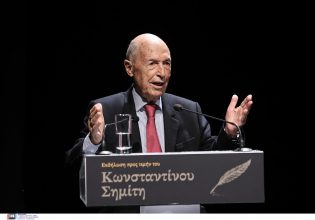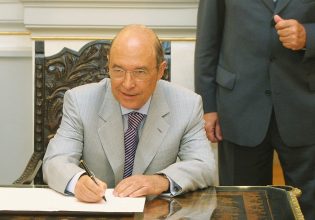
The Life of Former Prime Minister Kostas Simitis
Former Minister Kostas Simitis played a defining role in shaping Greece’s economic and political landscape at the turn of the millennium
Former Prime Minister Kostas Simitis played a defining role in shaping Greece’s economic and political landscape at the turn of the millennium.
Born in Athens in 1936, Simitis focused his political life on reforming Greece’s economy and bringing the country closer to Europe.
Simitis’ long political career began with studies in law at the University of Marburg in Germany and economics at the London School of Economics.
In 1965, Simitis co-founded the “Alexandros Papanastasiou” Political Research Group, aiming to research Greece’s economic and societal challenges. As the country fell under the military dictatorship, his activism took a more defiant turn. The group evolved into the anti-dictatorship “Democratic Defense,” and Simitis became a target of the regime.
During the dictatorship, Simitis fled abroad and was brought to trial in absentia before the Military Court for attempted arson and violation of the law on explosives. In retaliation, his wife, Daphne Simitis, was arrested and held in solitary confinement for two months.
He taught as an assistant professor at the University of Konstanz in 1971 and continued as a full professor of Commercial and Civil Law at the University of Giessen from 1971 to 1975. In 1977 he was elected full professor at the Panteion School (now Panteion University). He spoke English, French and German.
Following the fall of the dictatorship, Simitis became a founding member of the Panhellenic Socialist Movement (PASOK) in 1974.
Over the years, he held several key ministerial roles, including Minister of Agriculture, from 1981 to 1985, where he ensured the successful integration of Greek agriculture into the European agricultural policy, as well as the multiplication of subsidies; Minister of National Economy, from 1985 to 1987, where he implemented the first strict stabilization program, which addressed macroeconomic imbalances; Minister of National Education and Religious Affairs during the ecumenical government, under the presidency of Professor Xenophon Zolotas (November 1989 – February 1990); Minister of Industry, Energy and Technology and Minister of Trade simultaneously, from 1993 to 1995. During this time, he set the framework for a long-term development policy for the Greek economy.
Simitis’ ascent to the premiership in 1996 marked a new era for Greece. Succeeding Andreas Papandreou, he focused on reforming the economy, strengthening ties with the European Union, and preparing Greece for its pivotal role in the eurozone.
During his tenure, Simitis emphasized fiscal discipline, inflation control, and structural reforms, ensuring Greece met the Maastricht criteria for joining the Economic and Monetary Union (EMU). His vision extended beyond economics, as he sought to align Greece with the EU’s core decision-making processes.
Under his leadership, inflation dropped from 8.9% in 1995 to 2.1% in 1999, public debt was reduced, and Greece’s economy grew at an average annual rate of 3.5%, outperforming the eurozone average. By 2000, Greece was officially invited to join the euro, a historic milestone that Simitis championed as a step toward permanent economic and political stability.
While Simitis’ reforms brought significant progress, they also sparked resistance. Critics argued that austerity measures and structural reforms burdened the public, and some of his policies faced pushback from both political opponents and within PASOK itself.
His tenure was also marked by controversy regarding public debt management and allegations of irregularities in public finance practices. The liberalization of the financial markets contributed to some of the conditions that later precipitated Greece’s financial crisis
Yet Simitis’ legacy is one of bringing Greece into Europe and onto a global stage. His leadership prepared Greece for the 2004 Olympic Games, revamped the country’s economy, and aligned the nation with the broader European framework. His efforts elevated living standards and strengthened Greece’s standing in Europe.
Simitis retired from active politics in 2004, but his influence continued to shape discussions about Greece’s path forward. His commitment to European integration and modernization positioned Greece as a player within the EU.
Kostas Simitis died January 5, at the age of 88.
Source: tovima.com
Ακολουθήστε το in.gr στο Google News και μάθετε πρώτοι όλες τις ειδήσεις







![Άκρως Ζωδιακό: Τα Do’s και Don’ts στα ζώδια σήμερα [Τρίτη 07.01.2025]](https://www.in.gr/wp-content/uploads/2025/01/pexels-pixabay-290470-600x400.jpg)
































 Αριθμός Πιστοποίησης Μ.Η.Τ.232442
Αριθμός Πιστοποίησης Μ.Η.Τ.232442